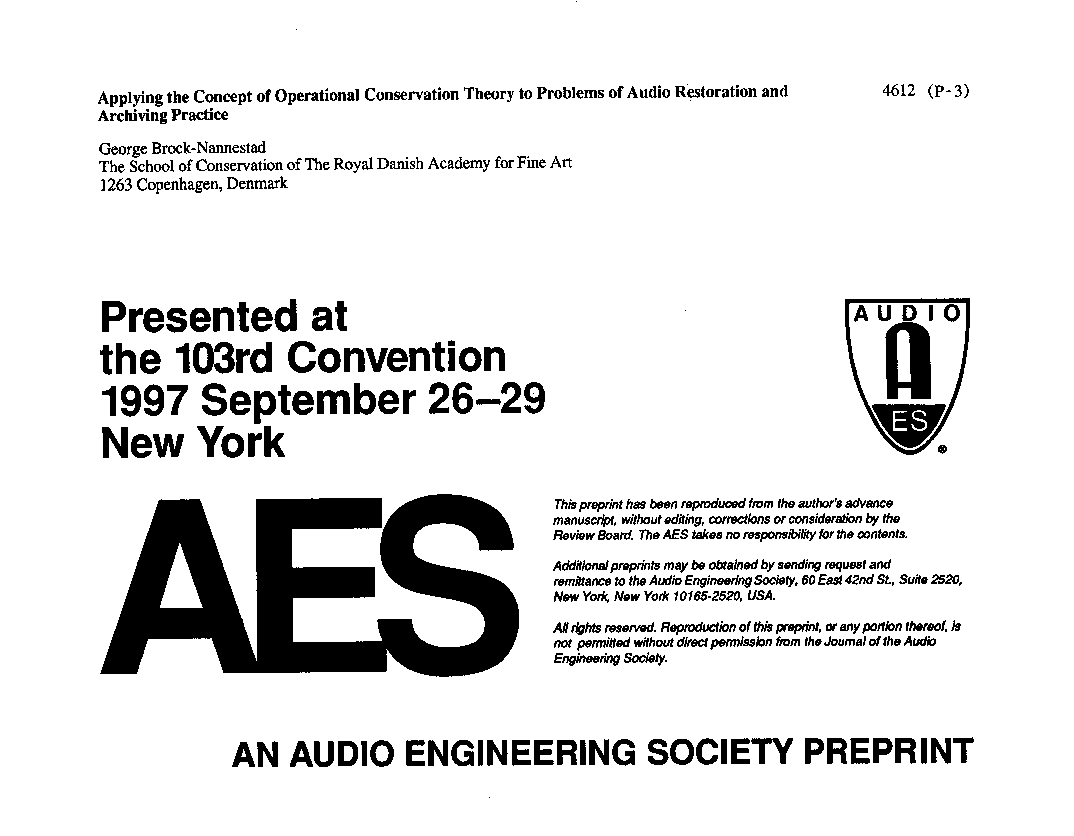Home / Publications / E-library page
You are currently logged in as an
Institutional Subscriber.
If you would like to logout,
please click on the button below.
Home / Publications / E-library page
Only AES members and Institutional Journal Subscribers can download
In the present context, Operational Conservation Theory regards a sound recording as a provider of input (information or stimulus) for present and future human use. It is proven how any restoration or archiving activity is a selection from the total amount of information or stimulus that a recording may give a present-day user. Only those features which have been consciously selected according to the purpose can consistently be made available to future users. For every proposed preservation policy the consequences may be objectively evaluated before adopting or rejecting it. By lifting the responsibility of choice, the archive actually enables a greater chance of preservation. Operational Conservation Theory merges a positivist approach with the behaviorist concept of Stimulus-Response (SR) and fundamental information science. This is a reasonable approach when we are confronted with the transfer of signals representing real or constructed events.
Author (s): Brock-Nannestad, George
Affiliation:
The School of Conservation of The Royal Danish Academy for Fine Art, Copenhagen, Denmark
(See document for exact affiliation information.)
AES Convention: 103
Paper Number:4612
Publication Date:
1997-09-06
Import into BibTeX
Session subject:
Sound Restoration and Archiving
Permalink: https://aes2.org/publications/elibrary-page/?id=7167
(1002KB)
Click to purchase paper as a non-member or login as an AES member. If your company or school subscribes to the E-Library then switch to the institutional version. If you are not an AES member Join the AES. If you need to check your member status, login to the Member Portal.

Brock-Nannestad, George; 1997; Applying the Concept of Operational Conservation Theory to Problems of Audio Restoration and Archiving Practice [PDF]; The School of Conservation of The Royal Danish Academy for Fine Art, Copenhagen, Denmark; Paper 4612; Available from: https://aes2.org/publications/elibrary-page/?id=7167
Brock-Nannestad, George; Applying the Concept of Operational Conservation Theory to Problems of Audio Restoration and Archiving Practice [PDF]; The School of Conservation of The Royal Danish Academy for Fine Art, Copenhagen, Denmark; Paper 4612; 1997 Available: https://aes2.org/publications/elibrary-page/?id=7167
@article{brock-nannestad1997applying,
author={brock-nannestad george},
journal={journal of the audio engineering society},
title={applying the concept of operational conservation theory to problems of audio restoration and archiving practice},
year={1997},
number={4612},
month={september},}